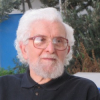Abraham Pais

Abraham Pais
Abraham Paiswas a Dutch-born American physicist and science historian. Pais earned his Ph.D. from University of Utrecht just prior to a Nazi ban on Jewish participation in Dutch universities during World War II. When the Nazis began the forced relocation of Dutch Jews, he went into hiding, but was later arrested and saved only by the end of the war. He then served as an assistant to Niels Bohr in Denmark and was later a colleague of Albert Einstein at...
NationalityDutch
ProfessionScientist
Date of Birth19 May 1918
long-ago two people
There is not a soul on Earth who can read the deluge of physics publications in its entirety. As a result, it is sad but true that physics has irretrievably fallen apart from a cohesive to a fragmented discipline. ... It was not that long ago that people were complaining about two cultures. If we only had it that good. today.
development paper physics
[Heisenberg's seminal 1925 paper initiating quantum mechanics marked] one of the great jumps—perhaps the greatest—in the development of twentieth century physics.
discovery
To make a discovery is not necessarily the same as to understand a discovery.
writing fundamentals paper
Of course, relative citation frequencies are no measure of relative importance. Who has not aspired to write a paper so fundamental that very soon it is known to everyone and cited by no one?
war needs caught
One of the absolute rules I learned in the war was, don't know anything you don't need to know, because if you ever get caught they will get it out of you.
book thinking people
One of the things I learned, one of the strangest things, is how to think. There was nothing else to do. I couldn't see people, or go for a walk in the forest. All I had was my head and my books, and I thought a lot.
moving games able
The rule of the game was never assume that anybody, however honorable, would be able to stand up under torture. If Mr. X, who knew where I was, was caught for some reason, I should move.
morning writing night
I spent every night until four in the morning on my dissertation, until I came to the point when I could not write another word, not even the next letter. I went to bed. Eight o'clock the next morning I was up writing again.
stars crazy yellow
Once I even took the train to Utrecht, forty miles from Amsterdam, with my yellow star, this star which I still have. Why did I go? I just wanted to visit some friends. I was a little bit crazy, a little bit insane.
science issues biographies
[George] Uhlenbeck was a highly gifted physicist. One of his remarkable traits was he would read every issue of T%he Physical Review from cover to cover.
numbers fancy exploration
A number of current theoretical explorations will turn out to be passing fancies...
loss discovery physicist
To make a discovery is not necessarily the same as to understand a discovery. Not only Planck but also other physicists were intially at a loss as to what the proper context of the new postulate really was.
book writing courses
Deliberately or not, every author is of course present in every book he or she writes - even in a scientific text.
lying war silly
I knew all the time I was going to get through the war. It was completely irrational, a silly idea, but I was not going to lie down and get myself killed. I was going to get out of it.